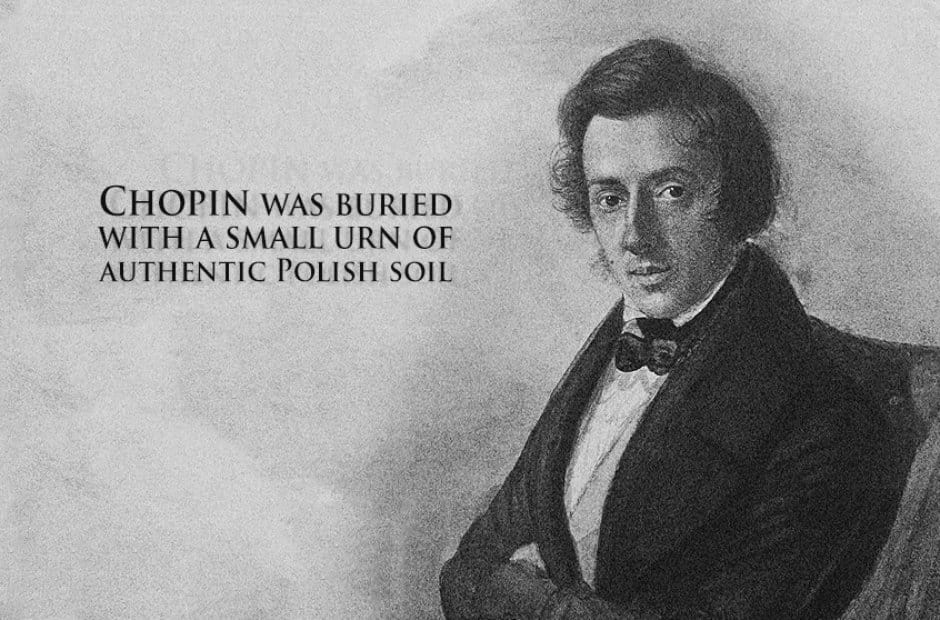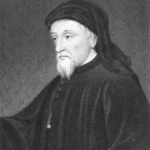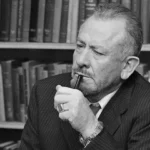Think of Frédéric Chopin, the legendary composer, as a rock star of his time. But behind the beautiful melodies, there’s a guy with tales and unusual facts that would make a biography read like an epic novel. Let’s dive into the life of this musical genius, from his childhood wonders to his tragic end, and discover the intriguing secrets and stories that made him the icon we know today.
Interesting Facts About Frédéric Chopin
Let’s dive into the captivating world of Frédéric Chopin, a musical genius whose story is as intriguing as his compositions. Born near Warsaw in 1810, even as a young boy, Chopin had an extraordinary talent that captivated everyone who heard him play. It was like his tiny hands held magic, drawing incredible music from the piano.
Key Points about Frédéric Chopin:
- Born in Poland in 1810 with extraordinary musical talent.
- Music deeply influenced by Polish folk dances, creating a distinctive “Chopin” sound.
- Mastered musical storytelling through expressive melodies, intricate harmonies, and ornamentation.
- Fused Romantic passion with classical elegance, creating a unique and deeply personal style.
- Renowned for evocative nocturnes and technically challenging études.
- Struggled with stage fright, preferring intimate settings for performances.
- Influenced by George Sand, a celebrated novelist who inspired his emotional depth in music.
- Passed away tragically at age 39 from tuberculosis.
- Legacy as a composer continues to grow stronger, with music that resonates with audiences worldwide.
His music is deeply intertwined with his Polish roots. You can almost hear echoes of traditional Polish folk dances, like the mazurka and polonaise, woven into his melodies. It’s like he bottled up the spirit of Poland and poured it out through his compositions. This profound connection to his homeland shines through, making his music distinctly “Chopin.”
Chopin was a true master of musical storytelling. His compositions are brimming with expressive melodies, those catchy tunes that stick in your head long after the music stops. But it’s not just catchy tunes; his music is layered with delicate harmonies and intricate ornamentation that add incredible depth and richness. Think of it as a beautifully woven tapestry, every note carefully placed to create a masterpiece.
He seamlessly blended the passionate spirit of the Romantic era with the structured elegance of classical form. This unique fusion creates a sound that’s both grand and deeply personal, like he’s pouring his heart and soul into every piece. This emotional depth is particularly evident in his nocturnes and études. The nocturnes are like lullabies for the soul, full of dreamy melodies and a touch of melancholy. On the other hand, his études, while beautiful, showcase his incredible technical skill, proving he could make the piano sing and dance.
However, despite his immense talent, Chopin was a bit of an introvert, especially when it came to performing. He grappled with severe stage fright, often finding the grand stage daunting. He much preferred the cozy atmosphere of salons and private gatherings. It was in these intimate settings, surrounded by friends and fellow artists, that he truly blossomed. Away from the glare of the public eye, he could fully immerse himself in the music, letting his emotions flow freely through his fingers. This preference for smaller settings meant he devoted more time to composing, pouring his heart into creating beautiful music for all to enjoy.
Speaking of influence, we can’t talk about Chopin without mentioning the significant woman in his life – George Sand. Now, George Sand wasn’t just any woman; she was a celebrated novelist with a mind of her own. Their love affair, which spanned a decade, wasn’t always smooth sailing, but it profoundly impacted Chopin’s life and his music. Sand was like a breath of fresh air for Chopin. Her intellectual and artistic spirit challenged and inspired him, pushing him to explore new emotional depths in his music. Some of his most passionate and evocative compositions were born during their time together. It’s like their love story became intertwined with his music, adding layers of complexity and emotion.
Sadly, Chopin’s life was cut tragically short. He battled tuberculosis for many years, a disease that often claimed those with artistic souls. He passed away in 1849 at the young age of 39, leaving a void in the music world that no one has ever truly filled. Even though his time was short, his legacy as a composer only grew stronger with time.
Today, his music continues to resonate deeply with audiences worldwide. It’s a testament to his raw talent and the enduring power of music to touch our hearts and souls. Despite the passage of time, Chopin’s music retains its power to transport us to another world, a world of exquisite beauty, heartfelt emotion, and pure musical genius.
What is One Interesting Fact about Chopin?
We’ve already talked about Chopin’s incredible talent—the dude was basically a piano prodigy by age eight! And yeah, his love affair with George Sand was the stuff of legends—full of passion and drama. But did you know that Chopin actually preferred to play the piano in complete darkness?
It’s true! This wasn’t just some quirky habit either. It seems Chopin believed that playing in the dark heightened the emotional impact of the music. Imagine that—sitting in a silent room, completely enveloped by darkness, and then suddenly, the music begins… It must have been a truly captivating experience!
Some folks even suggest this might have been Chopin’s way of dealing with stage fright. It’s fascinating to think about, right? Here’s this genius composer, renowned throughout Europe, and yet, even he might have grappled with performance anxiety. It just goes to show that even the most brilliant artists are human, with their own unique quirks and vulnerabilities.
Did Chopin Have a Nickname?
You know how some people get nicknames that perfectly capture their personality? Well, Frédéric Chopin, the super-famous Polish-French composer, was no different! While he wasn’t running around calling himself “The Hammer” or anything, his publishers started calling him “The Poet of the Piano,” and it stuck like glue.
Think about it: Chopin’s music wasn’t just about hitting the right notes; it was like he was pouring his heart and soul into every single chord. His pieces weren’t just melodies; they were stories, full of emotions and feelings that just grabbed you. “The Poet of the Piano” wasn’t just a cute nickname; it perfectly described the magic Chopin created with every note.
This wasn’t just a random label, though. Chopin drew a lot of inspiration from all sorts of places, and some experts suggest that even the great Johann Sebastian Bach’s works influenced him early on. Plus, his life wasn’t all about music. He had a ten-year relationship with the amazing writer George Sand (who was actually older than him—scandalous!). All these experiences, the good and the bad, found their way into his music, making it even more powerful and relatable.
And let’s not forget his love for the Pleyel piano. Chopin wasn’t just playing any old instrument; he worked closely with the French builders to make sure the Pleyel piano could handle all his musical ideas. It was like his instrument was an extension of himself, and together, they made some of the most beautiful music the world has ever heard.
Even though he lived over 200 years ago, Chopin’s music still blows people away. “The Poet of the Piano” wasn’t just a catchy phrase; it perfectly sums up how this incredible composer could use music to paint pictures, tell stories, and make you feel things deep down.
What Made Chopin Unique?
So, we’ve talked about how Chopin was a total rockstar on the piano and all the feels his music gives us, but what was it specifically that made him stand out from the crowd of other composers at the time?
One thing was that he wasn’t afraid to pour his heart and soul into his music. Think about it – music was like his diary, a way to express all the things words couldn’t, especially with his Polish heritage woven into every note. Imagine those traditional folk melodies finding a new voice through his crazy-good piano skills!
And speaking of skills, dude was a straight-up piano wizard. He didn’t just play the piano; he became the piano. He was pushing boundaries with techniques that made other composers do a double-take, like “Hold up, you can DO that on a piano?” His music wasn’t just about hitting the right notes; it was about making the instrument sing, cry, and whisper.
But here’s the thing: Chopin wasn’t just some technical machine churning out complex tunes. He was a Romantic Era composer through and through, meaning he was all about capturing those intense emotions and poetic vibes. His music wasn’t just meant to be heard; it was meant to be felt deep down.
Think about it – some experts believe that part of his genius came from being a killer pianist himself. Because he knew the instrument inside and out, he could write music that truly took advantage of what the piano could do, stuff that other composers might not have even thought possible.
There’s still so much we’re learning about how Chopin achieved his signature sound. Researchers are constantly digging deeper into his life, his influences, and even the actual manuscripts of his work to uncover more of his secrets. It’s like a musical puzzle that we’re still putting together, and each new discovery makes us appreciate his genius even more.
What is Important about Frédéric Chopin?
We’ve already talked about how crazy talented Frédéric Chopin was as a pianist, but let’s dive a little deeper into what made him so special and why people still get excited about his music today.
Imagine music that could make you feel like you were floating on a cloud one minute, then suddenly sweep you up in a whirlwind of emotions the next. That’s the magic of Chopin. He had this incredible knack for pouring his heart and soul into his music, and it really shows.
One of the things that makes his work so unique is how he took inspiration from the traditional folk music of his homeland, Poland, and blended it seamlessly with the classical style that was popular in his time. It’s like he created a whole new flavor of music – a little bit sweet, a little bit dramatic, and totally captivating.
And let’s not forget about his skills on the piano! Chopin wasn’t just playing the piano; he was having a conversation with it. He came up with these innovative techniques, like using “rubato” (which is basically slowing down or speeding up the tempo to create a more dramatic feel) and experimenting with the pedals in ways that no one had really explored before. This allowed him to create a wider range of sounds and emotions on the piano, making it almost like a singing voice.
Speaking of emotions, Chopin’s music is full of them! Whether he was feeling melancholic and lost in thought or bursting with joy and passion, he poured all of himself into each note. You can practically feel the emotion dripping from his nocturnes, which are like beautiful, dreamy lullabies, and his études, which are these super challenging but incredibly rewarding pieces that showcase the full range of a pianist’s skill.
But Chopin’s impact goes way beyond just his own compositions. He was a huge inspiration for tons of composers who came after him. Think of musical giants like Franz Liszt, Edvard Grieg (check out these interesting facts about Edvard Munch), and even Claude Debussy – they were all influenced by Chopin’s innovative style and emotional depth.
It’s kind of sad, but Chopin’s life was cut short when he was only 39, probably due to tuberculosis. But even though he didn’t live very long, he left behind a legacy that continues to inspire and move people all over the world. His music is like a window into his soul, and it’s a privilege to be able to experience it.
Did Chopin Have Seizures?
So, we know Chopin wasn’t exactly the picture of health, right? Tuberculosis was a huge burden for him, but there was more going on than just that. The guy had all these other issues – seizures, fainting spells, always feeling wiped out. It’s a lot for anyone to deal with!
And you know those intense hallucinations he described? Seeing loved ones who’d passed away, even weird creatures popping up around his piano? Well, for a long time, people just chalked those up to his artistic side, like it was just his imagination running wild. But nowadays, experts are starting to wonder if those hallucinations were actually linked to epilepsy. It makes you think, huh? Epilepsy affects the brain in all sorts of ways, and some researchers believe it could’ve messed with how he processed images and sounds, leading to those vivid experiences.
The thing is, epilepsy probably didn’t help his other health problems either. He was already prone to getting sick, and constantly dealing with seizures and feeling lousy likely made his immune system even weaker. It’s like his body was fighting a battle on multiple fronts. But even with all that going on, Chopin poured his heart into his music. He was incredibly dedicated, and it shows in the amazing pieces he left behind. Talk about inspiring!
Did Chopin Have a Wife?
So, we’ve been talking about Chopin’s love life, and it’s true that his relationship with George Sand was a big deal. Think passionate love letters and gorgeous music inspired by their time together. But here’s the thing – they never actually tied the knot. Chopin was quite the heartthrob back in the day, but marriage wasn’t in the cards for him. He had a few other romances, but they were usually pretty short-lived and often tinged with unrequited feelings, you know, that “will they, won’t they” kind of drama.
Now, to answer your question directly – did Chopin have a wife? Nope, he didn’t. Some scholars suggest that his constant fear of his illness returning might have made him hesitant to commit fully. Others believe he poured all his romantic energy into his music, which, let’s be real, is some of the most romantic music ever written! It’s like each note holds a piece of his heart, yearning for a love that could last.
Sadly, Chopin’s life was cut short by tuberculosis when he was only 39. It makes you wonder what other masterpieces he might have created if he’d had more time. But even though he never married, his music continues to resonate with that deep, soulful longing that speaks to the heart of what it means to love and lose.
What’s So Great about Chopin?
So, we’ve already talked about how Chopin was this musical prodigy, right? Like, the guy was basically born with a piano in his hands! Publishing his first composition at the tender age of seven? Performing in public by eight? Yeah, this wasn’t your average kid. But what really sets Chopin apart? Why is his music still so captivating after all these years?
One of the things that makes Chopin so unique is how he expertly blends his Polish roots with this refined, classical style. Imagine hearing a folk song your grandmother might have sung, but then it’s elevated, transformed into something incredibly elegant and sophisticated. That’s Chopin for you! He took these familiar, traditional sounds and infused them with this whole new level of artistry that just blew people away.
And then there’s his incredible skill with the piano. It’s like he unlocked hidden dimensions within the instrument! The way he uses harmony, rhythm, and ornamentation – it’s like he reinvented the piano’s possibilities. His music wasn’t just meant to be heard; it was meant to be felt.
Listening to Chopin is an emotional journey. His melodies are so expressive, so full of longing and passion, while his harmonies are rich and intricate, drawing you deeper into his world. It’s no wonder his music still resonates so strongly with people today.
But Chopin’s life, like his music, was full of both joy and sorrow. His love affair with the writer George Sand was tumultuous, to say the least, and he battled tuberculosis for much of his life. Despite these challenges, Chopin poured his entire being into his music, leaving behind a legacy that continues to inspire and amaze.
What is One Fact about Kate Chopin?
So, we’ve already established that Kate Chopin was a pretty big deal in the literary world. Born Katherine O’Flaherty in St. Louis in 1850, she didn’t just dabble in writing – she dove headfirst! Her first short story hit the scene in 1889, and she never really looked back.
Now, you might be wondering what makes her so special. Well, picture this: it’s 1899, and a novel called “The Awakening” drops. This wasn’t your typical love story. Chopin’s book explored female desire with a frankness that had people clutching their pearls (and secretly devouring every word). It caused a major stir, branding Chopin as a bit of a rebel – and cementing her place in literary history.
The thing is, Chopin’s own life was just as interesting as her stories. She was married to Oscar Chopin, a Creole businessman, and together they had six children. Sadly, he passed away in 1882, leaving Chopin to raise their family alone. She moved back to St. Louis and, despite the challenges, kept writing. Novels, short stories – she poured her heart into her work right up until her death in 1904.
Think about that for a second. A widow, a single mother of six, in a time when women were expected to be seen and not heard… Chopin used her voice to paint vivid pictures of women’s lives, their desires, their struggles. It’s no wonder she’s considered a pioneering figure in American literature, with “The Awakening” often hailed as a feminist masterpiece.
But here’s the thing about Chopin: there’s always more to discover. Scholars are still uncovering layers of meaning in her work, debating her influences and motivations. They’re finding connections to French literature, exploring the impact of her Creole surroundings, and analyzing how she tackled themes of identity and societal expectations.
What we do know for sure is this: Kate Chopin’s legacy is far from over. Her stories continue to resonate with readers today, sparking conversations and challenging us to see the world through a different lens.
Why Did Chopin Change His Name?
So, we were talking about Frédéric Chopin, right? The musical genius, the piano virtuoso. You know him, everyone knows him. But did you know he wasn’t always “Frédéric”? He was born Fryderyk Franciszek Chopin – quite a mouthful, isn’t it?
Now, why would someone trade in such a distinguished Polish name for a French one? Well, like a good mystery, there’s no definitive answer, just intriguing possibilities.
Some folks say it was all about practicality. Imagine a Parisian announcer trying to wrap their tongue around “Fryderyk Franciszek Chopin” – it’s a recipe for a pronunciation disaster! “Frédéric Chopin” just rolls off the tongue, especially in French. Makes sense, doesn’t it?
But here’s another thought: Poland wasn’t exactly peaceful back then. It was a time of political turmoil, and some believe Chopin wanted to distance himself from the potential baggage his Polish name carried, at least in the eyes of the world.
Of course, this doesn’t mean he loved his homeland any less. Listen to his music – it’s full of Polish folk melodies and rhythms. It’s almost like he wove his Polish soul into every note, regardless of what his name sounded like on a Parisian concert poster.
It’s a bit of a historical head-scratcher, this name change business. But maybe that’s part of what makes Chopin so fascinating. He left us with beautiful music and a little mystery to ponder.
What Piece is Chopin Most Famous For?
So, you’re curious about Chopin’s claim to fame? While he composed tons of incredible music, there’s one piece that seems to pop up everywhere, the one everyone and their grandmother recognizes – the Nocturne in E-flat major, Op. 9, No. 2.
Think of it as the “Stairway to Heaven” or “Bohemian Rhapsody” of the classical music world. It’s that popular, and for good reason! Composed way back in 1831, this piece perfectly captures Chopin’s genius for creating music that just gets to you.
Imagine a melody so beautiful it could make you cry, floating over these delicate, rippling notes that sound like a gentle stream. That’s this nocturne in a nutshell. And then there’s Chopin’s masterful use of “rubato,” which is like bending the tempo of the music to make it even more expressive. It’s like he’s talking to you directly through the piano, pouring his heart out with every note.
Even other famous musicians were blown away by this piece. Robert Schumann, another big-deal Romantic composer, called it “a pearl of purest water,” which is pretty high praise! And Franz Liszt, the rockstar pianist of his time, was totally captivated by its “ethereal beauty.” See, it’s not just us regular folks who get swept away by this music!
But here’s the thing about the Nocturne in E-flat major – it’s not just stuck in some stuffy concert hall. It’s everywhere! You’ve probably heard it in movies, TV shows, maybe even your favorite video game, you just didn’t realize it was Chopin. It’s that piece of music that just seems to fit perfectly in any situation that calls for beauty, drama, or a touch of melancholy.
Almost 200 years later, people are still moved by this piece. It’s been played by countless pianists, each one bringing their own personal touch to it. And you know what? That’s the beauty of music like this. It’s timeless, speaking to something deep within us, no matter who’s playing or listening.
















